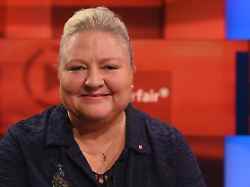Image of Russia by East Germans
“Russians are not 100 percent devils”
By Marko Schlichting
10/25/2022, 03:50 am
Russia invades Ukraine, its soldiers terrorize the civilian population, reduce infrastructure and entire cities to rubble. Nevertheless, people, especially in East Germany, find it difficult to distance themselves from the aggressor. This is also confirmed by the former Saxon Greens MP Antje Hermenau in “Hart aber Fair”.
In East Germany there are “Monday demonstrations” again. There are protests against the energy policy of the federal government – above all against the sanctions that the EU imposed on Russia after the attack on Ukraine. The tenor of the protests: the sanctions harmed Germany more than Russia and should therefore be removed. And many demonstrators are openly siding with the aggressor, Russia, for whom they have a lot of sympathy. Where that comes from and why so many people in East Germany in particular have no confidence in democracy is the subject of Monday evening’s “Hart aber Fair” on ARD.
Former Green Party politician Antje Hermenau asks herself: do people really not agree with democracy, or is it more about the work of the federal government? Hermenau, a former civil rights activist in the GDR, then a Greens member of the Bundestag and the Saxon state parliament for many years, left the Greens in 2014 and founded a citizens’ initiative that supported the Free Voters. Today she is a political advisor. She identifies a hatred of Putin in today’s federal government, which was expressed in a statement by Federal Foreign Minister Baerbock. They said that Putin had to be destroyed. “I almost quoted her,” says Hermenau.
In fact, Baerbock did not speak of Putin’s annihilation. However, shortly after the war began, she justified the sanctions against Russia with the words: “The sanctions will ruin Russia.” In July 2022, she accused Putin: “He (in the war against Ukraine – the author) is concerned with the destruction, even of children.” Shortly before that, on May 1, in an interview on the ARD program “Anne Will,” she described the West’s goal in this war as follows: “Russia shouldn’t be able to get back on its feet economically for years.” Given the devastation and humanitarian catastrophe in Ukraine for which Putin is responsible, one might wonder whether the accusation that the government is inciting hatred against Putin might not be very one-sided.
“I would like to reconsider the sanctions”
However, Hermenau also has an important point when she points out the human rights violations in other countries. However, it is difficult to understand her impression that the federal government is silent about it. But she’s definitely right when she says: “The Russians made a lot of mistakes. But it’s also not true that they’re 100 percent just devils.”
Hermenau is critical of the sanctions against Russia. They hurt Germany more than Russia, she says. And she asks: “Who is supposed to rebuild Ukraine after the war if we now smugly throw ourselves at each other’s swords economically?” Similar to the Saxon Prime Minister Kretschmer, Hermenau would also like to reconsider the sanctions. “I don’t think they’re helping us.”
“GDR was a country by the grace of Russia”
The historian Stefan Creuzberger was born in Swabia and now teaches at the University of Rostock. He justifies the positive image of Russia of many East Germans with the glorification of the Soviet Union in the former GDR. “What was practiced in the GDR as German-Soviet friendship was a state-initiated event,” he says. Hermenau and the boxer Henry Maske, who was born in the GDR, agree with him. At events organized by the German-Soviet Friendship Society, for example, it was essentially about drinking tea, says Hermenau. In the GDR, one was just as little allowed to talk about the reparations that the GDR had to pay to the Soviet Union after the Second World War as about the rape of German women by Russian soldiers, explains Creuzberger.
Nevertheless, it is wrong to lump everyone in East Germany together on this point. In his view, a rather positive image of Russia prevails, especially in the generation that experienced the Cold War. “We have a generational problem,” he says. The Cold War shaped people in East and West Germany differently. “We have to deal with that.” Now it is important to learn from these experiences. “We have to start a conversation,” said Creuzberger. And you have to talk to people who are currently dissatisfied with democracy in Germany – and according to a recent survey, they live mainly in eastern Germany.
